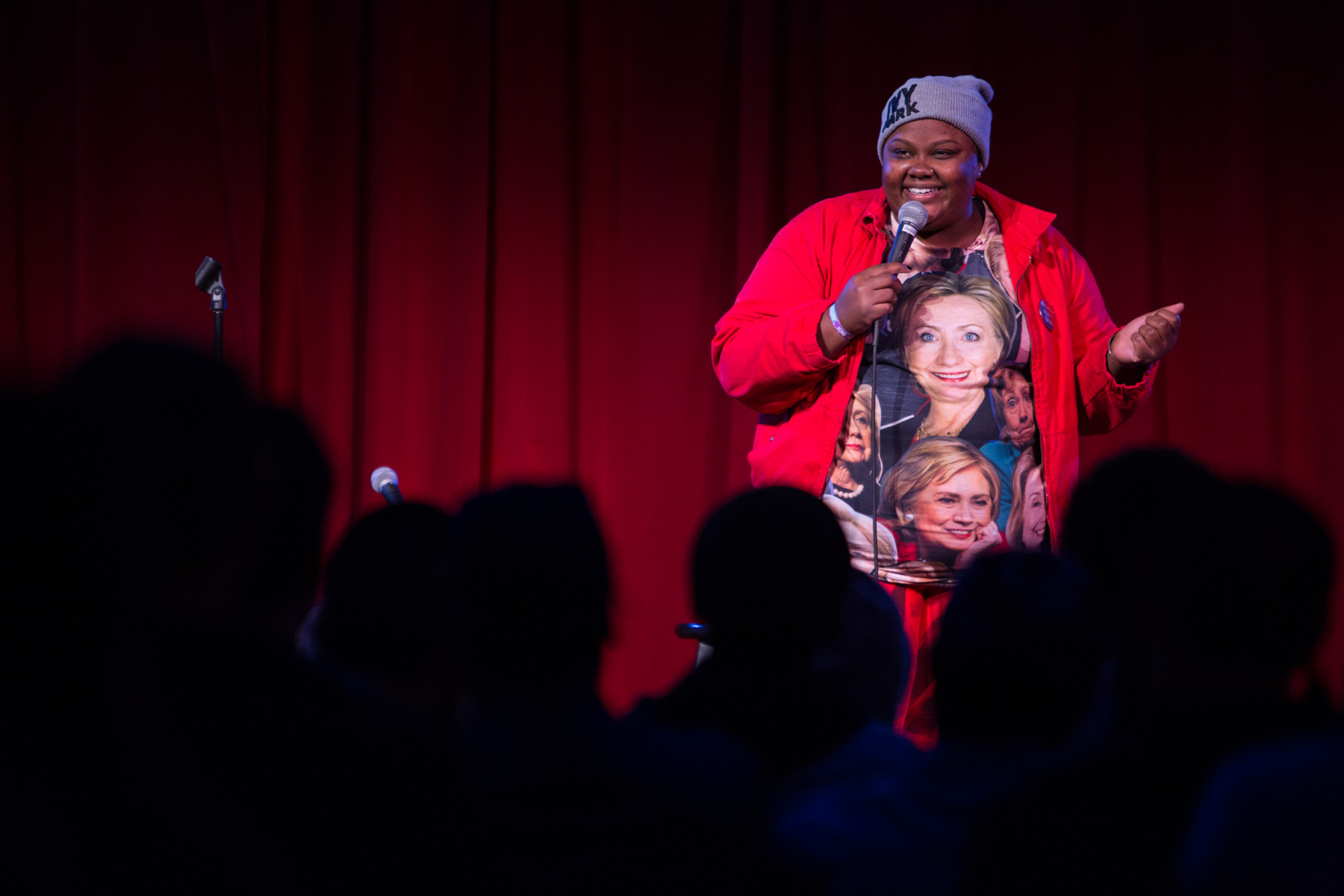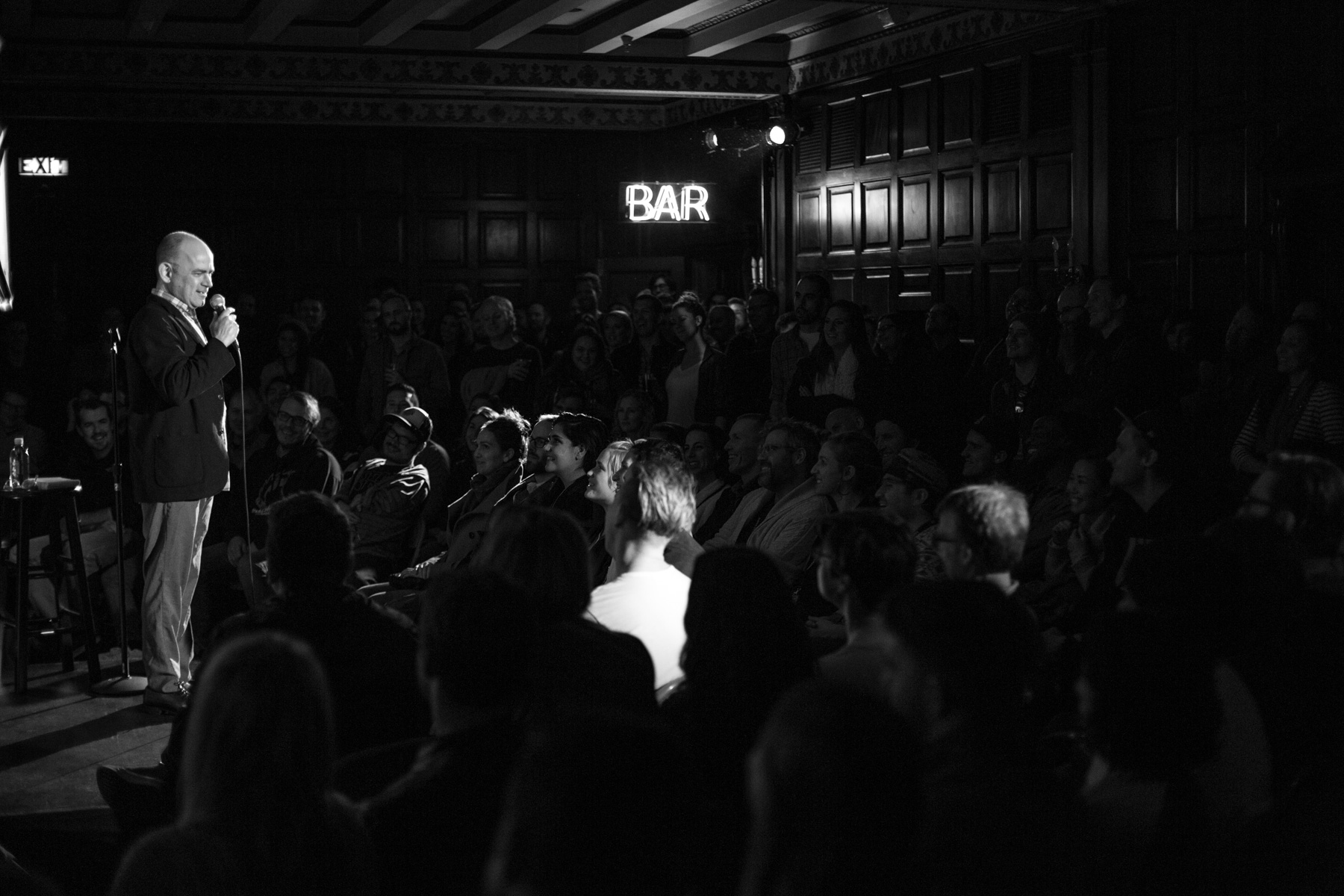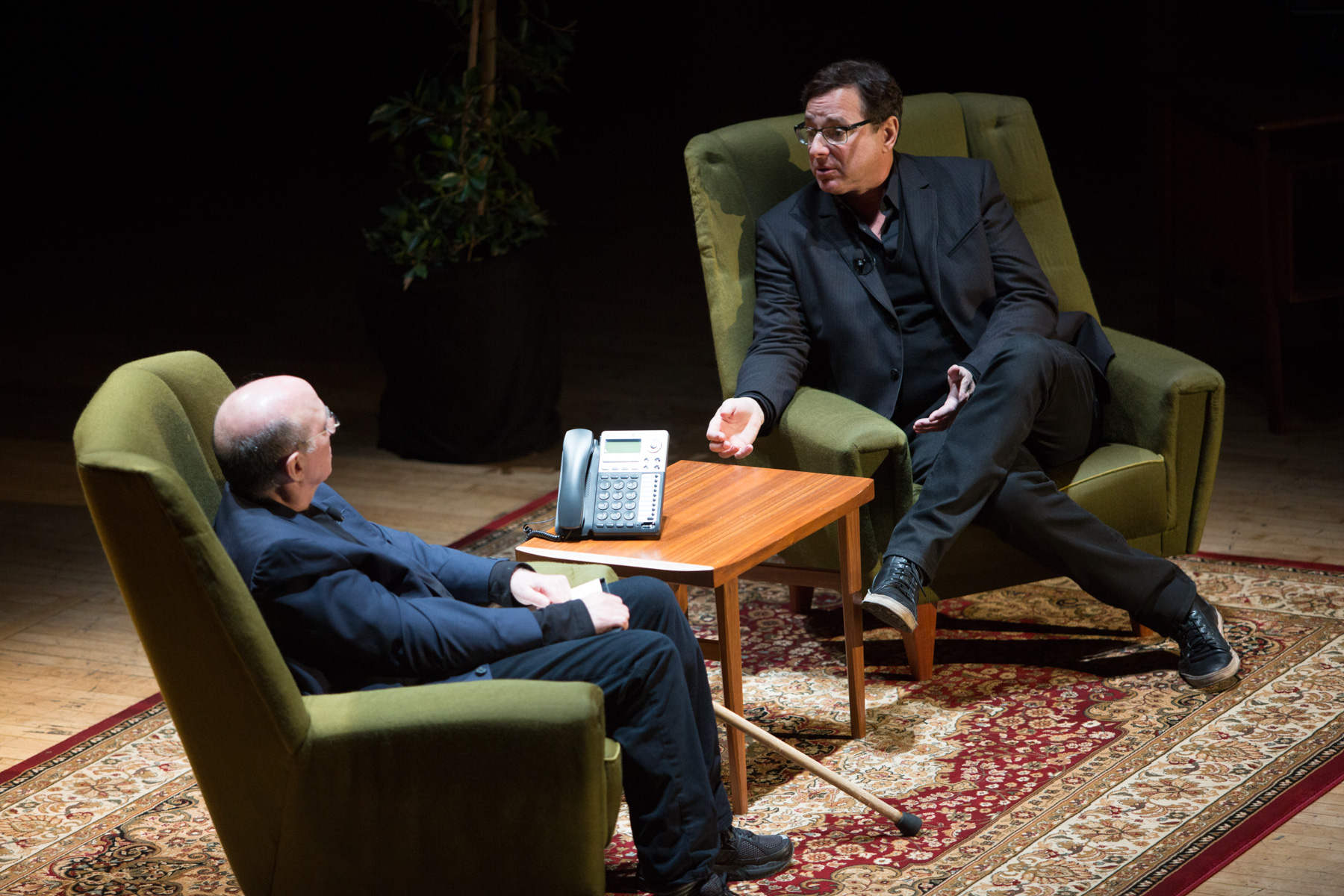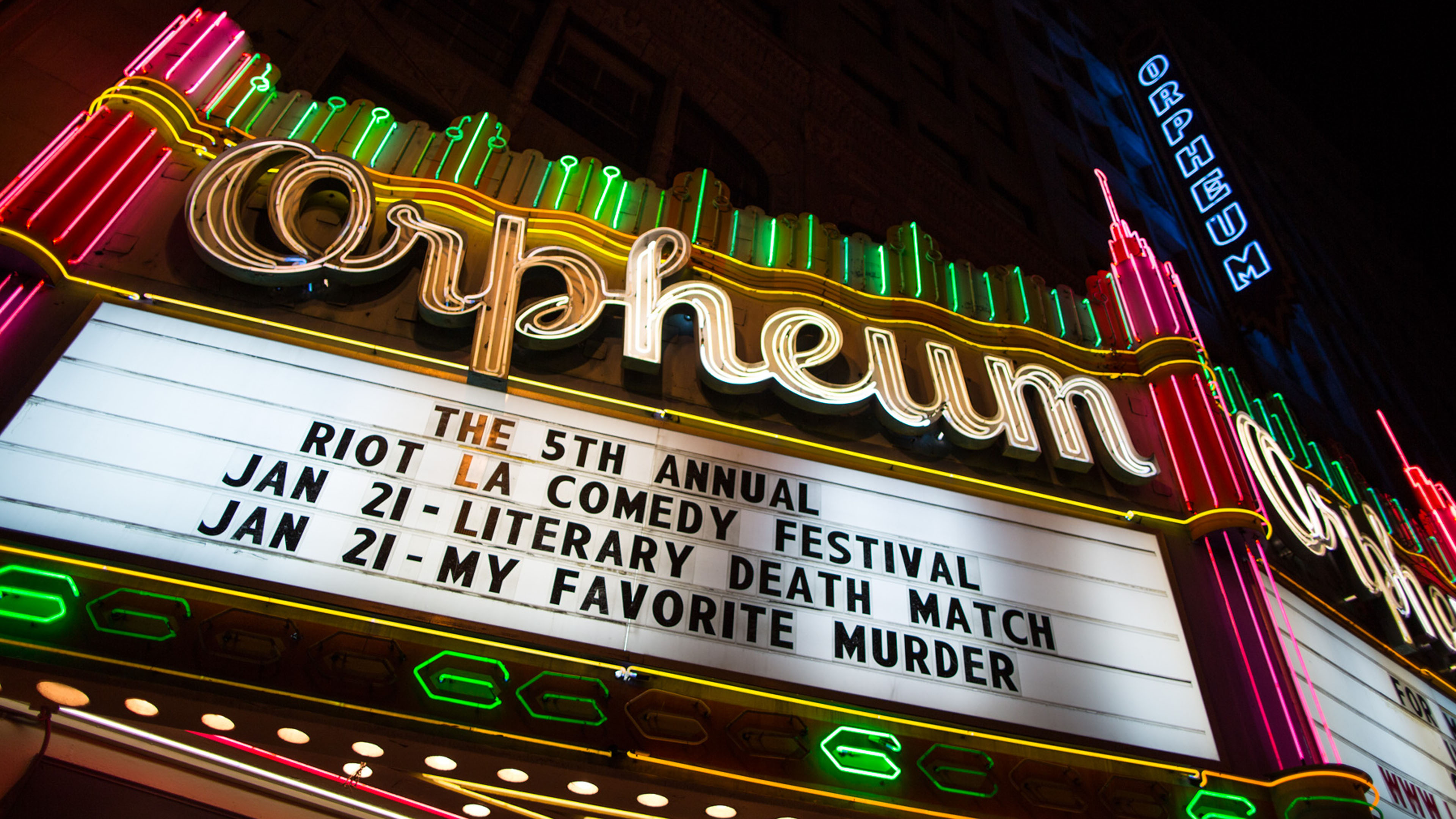A few minutes into Blazing Saddles, Mel Brooks’s breakthrough 1974 film, two black railroad workers become stuck in quicksand. While their overseers yuck it up over an unrelated misunderstanding, Charlie and Bart begin to realize the seriousness of their predicament.
“Am I wrong?” Charlie asks as they sink. “Or is the world rising?”
“I don’t know,” Bart replies. “But whatever it is, I hate it.”
It’s a strange and foreboding line in a strange and mostly (mostly) unfunny scene in a film that is still, forty-three years after it was released, both uproarious and unbelievable in its progressive treatment of race. But on the day of Donald Trump’s inauguration, on the big screen in the Microsoft Theatre—a place where only a couple of years ago Kendrick Lamar stood atop a cop car and declared that everything would be alright—it felt prescient, as if it had been scripted by Brooks for this very moment in American history.
The Blazing Saddles screening (and a live Q-&-A session with Brooks, who at ninety is more spry than any human person that you know) was, along with a quartet of sold-out shows from Ali Wong, one of Riot LA’s opening shots, and a particularly well-timed one at that. (Wong also sold out two more shows on Saturday night.) Brooks has been doing this live show for a while now, but surely the film’s depiction of a harrumphing, womanizing, buffoonish governor who uses racism in small-town America to gain political clout has never seemed so uncomfortable. It was odd, and almost sad, sitting in the Microsoft’s plush seats and allowing the true comedy of Brooks’s William J. Lepetomane to wash over the sense of doom that pervaded on Friday; it even rained all day in Los Angeles, if you’re one for the whole pathetic-fallacy thing.
“To write poetry after Auschwitz is barbaric,” the philosopher and cultural critic Theodor Adorno famously wrote in 1949 (famously, that is, among first-year grad students and online Marxists). His point was not that poetry’s seeming superfluousness was vulgar in the face of such horror, or that world culture should cease out of respect for the dead, but that the artistic forms that were complicit in the culture that gave rise to Hitler should be abandoned.
Can comedy, particularly the edgy leftiness favored by Riot’s lineup, do anything but reinforce the bubble?
It’s a harsh point, and one that’s been made again—albeit with less pugnacity—since Trump’s election. We are a bubble nation, we’ve been told, and those of us who live on the nation’s coasts or in urban centers are out of touch with our countrymen. In the punchdrunk effort to find a way to explain the rise of a populist, nativist oligarch, some writers have pinned the blame on John Oliver, Samantha Bee, Stephen Colbert, and a general culture of liberalism that seems to inform the joke-making and storytelling that set our society’s talking points. We’ve pushed our “agenda” too hard, made conservatives the butt of too many insults, have introduced too much progress to a different part of the country that’s being faced with issues of a very different sort.
(There are jokes coming, I promise.)
What, then, should comedy do? The date of this year’s Riot LA Comedy Festival, which largely took place over a beautiful Saturday and rainy Sunday in downtown Los Angeles just blocks from the site of the Women’s March, was set when the future looked quite different, and it was put on for an audience that was most assuredly complicit in the success of the aforementioned comics. But you can’t move your comedy festival just because the new president poses a threat to national security, just as you can’t expect comics—or artists of any stripe, for that matter—to focus on the mundane at a time like this. Still: it’s hard not to wonder why anyone would bother telling jokes right now, particularly when the context and speech-safety of a theater is a mirage that any dude with a phone and a willingness to tweet can easily wipe away. Put differently, can comedy, particularly the edgy leftiness favored by Riot’s lineup, do anything but reinforce the bubble? And if not, what’s the point?
https://www.youtube.com/watch?v=m4bmJmeNux4
As with the Blazing Saddles screening, the confluence of Riot with the moment at large was occasionally too much to bear. In a tent on Super Deluxe’s on-site Lot, Vic Berger traced the evolution of the last year or so with a presentation of his absurdist, deconstructed clips of Paula Deen hawking women’s wear (“Blue is one of God’s colors”) and the Republican debates (“Jeb is a mess”). But his edit of Trump’s instantly infamous appearance on Fallon—which shifts subtly from the weirdness of the moment and wanders into the host’s mind, where horrible clip after horrible clip of Trump speaking plays as Fallon is given one last chance to do anything other than ruffle the candidate’s hair—felt more like an elegy than a comedy. It was—and believe me, if you think it’s weird to read someone using this word to describe the work of a dude who wore a balaclava and hid behind a blow-up doll on stage, try actually feeling it—moving, and it did more to bolster the argument that Fallon deserves at least some kind of blame for Trump’s normalization than did a dozen breathless thinkpieces.
Still, comedy is comedy, and jokes are funny, and as a friend of mine is fond of pointing out, Freud once said that gallows humor is a sign of a richness of soul (Freud also noted that it didn’t erase the existence of the gallows, but stay with me here). In one of the Orpheum Theatre’s ancillary rooms, Aparna Nancherla and Jo Firestone screened clips from their webseries Womanhood and chatted about the March in a dry, unassuming tone—Nancherla was particularly miffed that her sign wasn’t as popular as that of a friend who had collaged together photos of Michelle Obama giving the side-eye. Guest comics Giulia Rozzi, Josie Long, and Nicole Byer all addressed the march directly (Byer while wearing an all-over-print Hillary t-shirt and a “period-blood-red” jumpsuit), all of them doing so with a kind of simple, matter-of-fact happiness that felt, at least in the afterglow of the March, like a strong-enough animating spirit to power through the next few years. Long, who is British, pitched herself as an envoy and guide, having already gone through a right-wing uprising in her own country, and her set effervesced beautifully as she tried again and again to relay words of hope from Atticus Finch, before each time returning to a giddy variation on the phrase “Let’s go kill that mockingbird.”

Nicole Byer (and Hillary) / photo by Zach Dobson
Todd Barry touched upon the inauguration only momentarily (“This show I’m about to do will only alleviate the first two years of pain”), but as he went around the tiny Cigar Room in the Orpheum’s basement soliciting stories from audience members, the gently rising and steady simmer of laughter and the inevitable (and inevitably dwindling) applause for every person who mentioned that they’d been at the March made it a sweet, communal event—a feeling that, truth be told, was the defining characteristic of every set I saw.
It was also what made it possible for both Nikki Glaser and Kyle Kinane to tell truly shocking assassination jokes on Sunday night. Both were genuinely transgressive, risky moves (“My mom is worried that I’m going to go to jail for that joke,” Glaser quipped) that don’t work in anything but the voices of the people who wrote them. There’s probably a good point to be made about whether it’s constructive—much less moral or ethical—to make jokes about the president being killed on his second day in office, and it wasn’t hard to imagine either joke being ripped out of the context of a friendly and non-threatening room and used as a flagrant example of the depravity of Hollywood elites; to be honest, I’m not sure that I wouldn’t have joined the chorus of shock if I hadn’t been there in the moment. But in the cold and rainy tent propped up in the Lot, at the end of a long and emotional weekend, it felt defiant and cathartic to hear someone take the risk of being gravely misunderstood—it was as though, for just a moment, these times were like any other.

Todd Barry working the crowd / photo by Zach Dobson
Catharsis and identification, then, and a sense of community, might be comedy’s greatest strength in these strange days. “It’s OK to joke about things that are painful,” Bob Saget said during a stage performance of Dr. Katz. Saget was earnest and sweet in his time on Jonathan Katz’s couch, gamefully playing along with the conceit and a bit more candid than one might expect as he lamented the return of Full House (“They say it’s the number-one show in the world, and that’s upsetting”). He got a huge round of applause when he corrected himself to say that he “had friends who support the new regime,” but that was the snipped ending punctuation to a long speech about the importance of respecting difference of opinion and the right of others to believe in different causes; the sense was that if Saget has truly lost any friends over the election, it wasn’t nearly so neat, clean, and painless.
On Monday morning, after being bombarded with trolling comments from Wilco fans who were disappointed to see Jeff Tweedy posting about the Women’s March, the singer wrote a note on the band’s Facebook page. After acknowledging the unlikeliness of his being able to change anyone’s mind, Tweedy wrote that the point of him trying to engage his audience politically is because it’s “a helpful reminder to like-minded people (our bubble?) not to despair and to try to remain hopeful. It’s a place for us to model some coping strategies that have made us feel better as citizens and to remind people to participate.”

Bob Saget airs it out with Jonathan Katz / photo by Zach Dobson
It’s unlikely that anyone who went into Riot hoping for an apolitical round o’ laffs had their hearts and minds changed, just as it’s hard to imagine anyone had their eyes opened by a dozen disapproving looks from the former First Lady (and if Michelle’s scorn couldn’t do it, what could?). But what Tweedy said is instructive. We are a nation of bubbles, it’s true, but this is nothing new; if America is defined by anything, it’s a commitment to the very individualism that assures the generation of bubbles. The United States is a country that was founded by secessionists, that has fought a war against secession, and that contains states that constantly flirt with giving secession another shot. Trump represents another secession—one from the idea of America as a place that gives birth and opportunity to people whose bubbles might have prevented them from succeeding and thriving elsewhere.
There was a true warmth to the room while Bob Saget spoke on Sunday night. Despite his (understandable!) reticence to give a generation of kids raised on his moral lessons yet another moral lesson, hearing him address his feelings so directly—without losing the comedic plot and sense of goodwill that is his unrequested trademark—gave off a kind of relief; you could practically hear the steam escaping from the room. The importance of that moment, and that feeling, can’t be understated. It’s a terrifying thing, to be buoyant on the winds of change when your whole world seems to burst. We might make noise as our boundaries expand. Forgive us if we scream. FL









